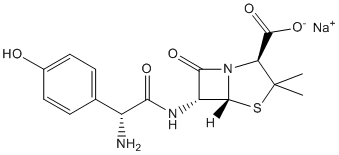All AbMole products are for research use only, cannot be used for human consumption.

Amoxicillin sodium (Amox) is a moderate- spectrum, bacteriolytic, β-lactam antibiotic. Amoxicillin sodium (Amox) is used to treat bacterial infections caused by susceptible microorganisms. Amoxicillin sodium (Amox) is usually the compound of choice within the class because it is better absorbed, following oral administration, than other β-lactam antibiotics. Amoxicillin sodium (Amox) is susceptible to degradation by β-lactamase-producing bacteria, which are resistant to a broad spectrum of β-lactam antibiotics, such as penicillin. For this reason, it is often combined with clavulanic acid. Amoxicillin sodium (Amox) acts by inhibiting the synthesis of bacterial cell walls. Amoxicillin sodium (Amox) inhibits cross-linkage between the linear peptidoglycan polymer chains that make up a major component of the cell walls of both Gram-positive and Gram-negative bacteria.
| Molecular Weight | 387.39 |
| Formula | C16H18N3O5S.Na |
| CAS Number | 34642-77-8 |
| Solubility (25°C) | Water 80 mg/mL DMSO 80 mg/mL |
| Storage |
Powder -20°C 3 years ; 4°C 2 years In solvent -80°C 6 months ; -20°C 1 month |
| Related Antibiotic Products |
|---|
| Puromycin-d3
Puromycin-d3 is the deuterium labeled Puromycin. Puromycin dihydrochloride is the dihydrochloride salt of puromycin. Puromycin is an aminoglycoside antibiotic that inhibits protein synthesis. |
| BSH-IN-1
BSH-IN-1 is a potent and covalent inhibitor of gut bacterial recombinant bile salt hydrolases (BSHs) with IC50s of 108 nM and 427 nM for B. longum BSH (Gram positive) and B. theta BSH (Gram negative), respectively. |
| AAA-10
AAA-10 is an orally active gut bacterial bile salt hydrolases (BSH) inhibitor, with IC50s of 10 nM, 80 nM against B. theta rBSH and B. longum rBSH respectively. |
| Gut restricted-7
Gut restricted-7 (GR-7) is a potent, covalent and orally active pan-bile salt hydrolase (BSH) inhibitor. Gut restricted-7 has a tissue-selective and is restricted to the gut. Gut restricted-7 decreases gut bacterial BSHs and decreases deconjugated bile acid levels in feces of mice. |
| N-Hydroxypipecolic acid
N-Hydroxypipecolic acid (1-Hydroxy-2-piperidinecarboxylic acid), a plant metabolite and a systemic acquired resistance (SAR) regulator, orchestrates SAR establishment in concert with the immune signal salicylic acid. N-Hydroxypipecolic acid accumulates systemically in the plant foliage in response to pathogen attack. N-Hydroxypipecolic acid induces SAR to bacterial and oomycete infection. |
All AbMole products are for research use only, cannot be used for human consumption or veterinary use. We do not provide products or services to individuals. Please comply with the intended use and do not use AbMole products for any other purpose.


Products are for research use only. Not for human use. We do not sell to patients.
© Copyright 2010-2024 AbMole BioScience. All Rights Reserved.
